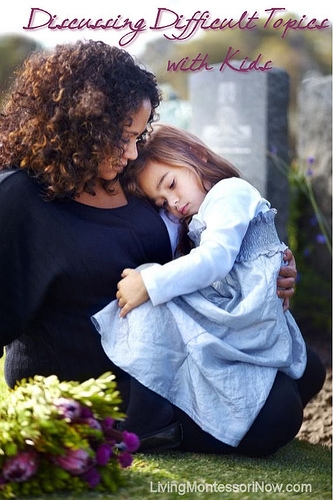
Whether the conversation was about death, sex, body image, drugs, alcohol, or avoiding peer pressure, a few parenting practices have worked well for me.
1. Open and Honest Communication
From the time my kids were little, my husband and I tried to treat them with respect and be open and honest with them. Will and Christina knew they could talk with us about anything. So, whenever they had a problem or question, we were the first people they came to for advice. That made everything easier when they were children … and especially when they were teenagers.
Any topic is helped with open and honest communication. For example, many families today have a loved one who has cancer. I have a post at BitsofPositivity.com on “Talking with Children about Cancer,” That discussion could be combined with an activity, such as making a “10 Things I Love About You” Book.
2. Books about Difficult Topics
I always found books helpful whenever I needed to talk with my kids about difficult topics or issues they were having problems with. When Will was 18 months old, he felt a lot of stress if he had to go to the doctor because of painful experiences with vaccinations. I went to the library and found a number of books about visiting the doctor. After we read those, Will felt confident when visiting the doctor.
From the time Will was a baby, I started collecting some books about death. I knew that if we had a death in the family, I would want the books but wouldn’t wish to start searching for them at the time. I was very thankful we had that collection when my maternal grandmother died when Christina was four years old.
I talk more about how we dealt with conversations about death in my post “Talking with Children about Death: Creating an ‘I Remember’ Book.” and “The Best Children’s Books about the Death of a Pet” (post from 2016). I also have a post on “Talking with Children about Tragedy.” In addition, I have a Helping Kids Cope Pinterest Board with links to helpful books and other resources.
I collected books about sex for various age levels, too. I made sure to find books that were factual and promoted positive values. It was very helpful to have those books whenever Will or Christina had questions or reached a stage of development that could be helped by a book. My husband and I always answered the questions they asked, and then I offered an appropriate book to help answer any additional questions.
3. Positive Role Models
For any difficult issues, it helped that my husband and I had the same values and tried to be positive role models. We have a happy marriage, and neither of us drink, smoke, or take drugs. I also didn’t complain about my body or how I looked (an attitude/gift handed down from my mother}. See “Body Image Resources” for a complete list of my posts on body image.
Because my husband and I presented consistent and unified ideas, our children appeared to have extra security. It seemed to help them feel confident enough to make positive choices that weren’t affected by peer pressure.
What’s worked for you in talking about difficult issues with your kids?
Learn more about my eBook Montessori at Home or School: How to. Teach Grace and Courtesy!
If this is your first time visiting Living Montessori Now, welcome! If you haven’t already, please join us on our Living Montessori Now Facebook page where you’ll find a Free Printable of the Day and lots of inspiration and ideas for parenting and teaching! And please follow me on Instagram, Pinterest (lots of Montessori-, holiday-, and theme-related boards), and YouTube. While you’re here, please check out the Living Montessori Now shop.
And don’t forget one of the best ways to follow me by signing up for my weekly newsletter. You’ll receive some awesome freebies in the process!






Deb, it’s always so nice to have the perspective of an experienced mom who has been through many of these difficult conversations and can share what helped along the way. Thanks!
-Kerry
Talk about planning ahead! Go you!
Good tips! I especially like the open and honest approach, with books as a fall back. Somethings a child may want information about but be too shy or uncomfortable to ask a parent directly. Having the book option gives them a way to look for the answers themselves.
I have a 2 1/2 year old daughter who is very medically fragile. She uses a life support machine to breathe at night because her body doesn’t do it for her. We realize that our time with her isn’t promised but it certainly is treasured.
She’s also got a five year old sister. A sister who loves and adores her and has never had the opportunity to know our youngest as anything other than at risk.
Our biggest trick, if you will, is in having mini conversations as often as they are natural. We’ve been slowly preparing our daughter for years for the possibility that her sister might die, just keeping it subtle. We talk about things that are real and painful any time she’s interested or natural conversation allows. And we let our five year old understand what things we do to protect her sister.
Such a good idea to have some books on hand for inevitable situations! Honestly, I like the idea of using books beforehand just to bring those topics up when they aren’t necessarily relevant. Then they can help prepare kids for the future. Thank you for sharing!
It’s so nice to hear what’s worked for you and your kids. I like the idea of collecting books on tough topics as you find them. I know for us, it’s an event or experience that triggers the need to read books like that — like Mikko’s traumatic dentist visits meant I started combing the library for good children’s dental books (and found there were a lot that weren’t helpful, sigh).
I loved your final point about being good role models, too — that’s very reassuring to think about.
I have posted about how I will deal with a death in the family for this carnival. I want to put together a memory book with them. I like the idea of finding books on the subject as a backup, to use after talking to them.
What a wonderful post. I particularly like the idea of collecting books on difficult topics so that you own them when you need them. I can see that being incredibly helpful! We are pretty open with our kids but sometimes a book can re enforce what a child is feeling, answer questions for them, or simply open up dialogue in ways we hadn’t thought to.
Thank you! =)
I think this is great advice for handling a host of uncomfortable topics. I also love the idea of collecting books about sex for different age levels. I’d love it if you could share a list of your favorites!
I love this carnival – and these 3 tips are spot on. Pinned!
Deb, thanks for sharing your experience to us, and yes we really have to be real good role models to our kids. This is were their values are formed and be better adults in the future.
Open honest communication and age-appropriate books that explain difficult topics. You’ve certainly been there done that! It’s great advice and I can relate to it when I was a child 🙂